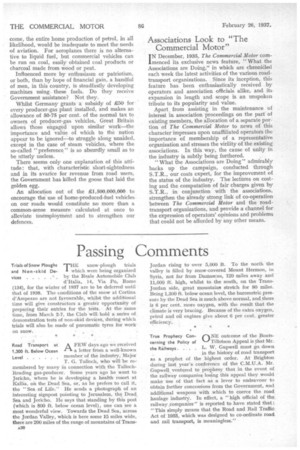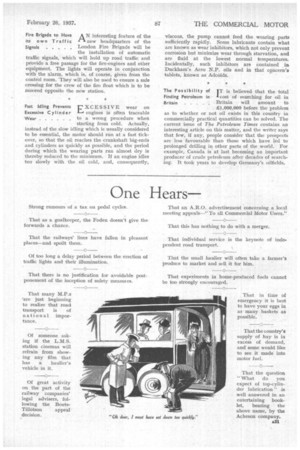Passing Comments
Page 32

Page 33

If you've noticed an error in this article please click here to report it so we can fix it.
Trials of Snow Ploughs THE snow-plough trials and Non-skid Dewhich were being organized vices by the Reale Automobile Club
d'Italia, 14, Via Po, Rome (134), for the winter of 1937 are to be deferred until that of 1938. The conditions of the snow at Cortina d'Ampezzo are not favourable, whilst the additional time will give constructors a greater opportunity of preparing their entries for the tests. At the same time, from March 2-7, the Club will hold a series of demonstration tests of non-skid devices, during which trials will also be made of pneumatic tyres for work on snow.
Road Transport at A FEW days ago we received 1,300 ft. Below Ocean 1-1. a letter from a welt-known
Level member of the industry, Major T. G. Tulloch, who will be remembered by many in connection with the TullochReading gas-producer. Some years ago he went to Jericho, where he is developing a health. resort at Kallia. oh the Dead Sea, or, as he prefers to call it, the "Sea of Life." He sends a photograph of an interesting signpost pointing to Jerusalem, the Dead Sea and Jericho. He says that standing by this post (which is 800 ft. below ocean level), one can see a most wonderful view. Towards the Dead Sea, across the Jordan Valley, which is here some 15 miles wide, there are 200 miles of the range of mountains of Trans A30 Jordan rising to over 5,000 ft. To the north the valley is filled by snow-covered Mount Hermon, in Syria, not far from Damascus, 120 miles away and 11,000 ff. high, whilst to the south, on the TransJordan side, great mountains stretch for 80 miles. Being 1,300 ft. below ocean level, the barometric pressure by the Dead Sea is much above normal, and there is 6 per cent, more oxygen, with the result that the climate is very bracing. Because of the extra oxygen, petrol and oil engines give about 6 per cent, greater efficiency.
True Prophecy Con(VIE outcome of the Boutscerning the Policy of '-"Tillotson Appeal is that Mr.
the Railways. . . L. W. Gupwell must go down in the history of road transport as a prophet of the highest order. At Brighton during last year's conference of the C.M.U.A. Mr. Gupweli. ventured to prophesy that in the event of the railway companies losing this appeal they would make use of that fact as a lever to endeavour to obtain further concessions from the Government, and additional weapons with which to coerce the road haulage industry. In effect, a "high official of the railway companies" is reported to have stated that : "This simply means that the Road and Rail Traffic Act of 1933, which was designed to co-ordinate road and rail transport, is meaningless."
Fire Brigade to Have
its own Traffic AN interesting feature of the new headquarters of the London Fire Brigade will be Signals
the installation of automatic traffic signals, which will hold up road traffic and provide a free passage for the fire-engines and other equipment. The lights will operate in conjunction with the alarm, which is, of course, given from the control room. 'They will also be used to ensure a safe crossing for the crew of the fire float which is to be moored opposite the new station.
Fast Idling Prevents XCESSIVE wear on
Excessive C ylinder engines is often traceable
Wear to a wrong procedure when starting from cold. Actually, instead of the slow idling which is usually considered to be essential, the motor should run at a fast tickover, so that the oil reaches the crankshaft big-ends and cylinders as quickly as possible, and the period during which the wearing parts run almost dry is thereby reduced to the minimum. If an engine idles too slowly with the oil cold, and, consequently, viscous, the pump cannot feed the wearing parts sufficiently rapidly. Some lubricants contain what are known as wear inhibitors, which not only prevent corrosion but minimize wear through starvation, and are fluid at the lowest normal temperatures. Incidentally, such inhibitors are contained in Duckham's Aero N.P. oils and in that concern's tablets, known as Adcoids.
The Possibility of jT is believed that the total Finding Petroleum in cost of searching for oil in Britain Britain will amount to £1,000,000 before the problem as to whether or not oil exists in this country in commercially practical quantities can be solved. The current issue of The Petroleum Times contains an interesting article on this matter, and the writer says that few, if any, people consider that the prospects are less favourable than those which have led to prolonged drilling in other parts of the world. For example, Canada is at last becoming an important producer of crude petroleum after decades of searching. It took years to develop Germany's oilfields.




























































































